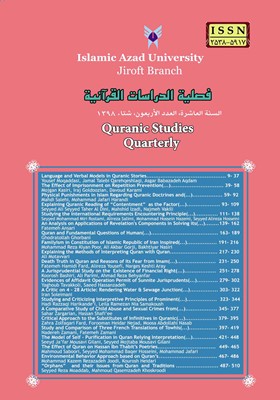Explaining the Methods of Interpreting Quran with Quran
Subject Areas : Quarterly Sabzevaran Fadak
1 - Assistant Professor, Shahid Chamran University, Ahwaz
Keywords: تفسیر قرآن, روش مطلق با مقیّد, مجمل با مفصل, عام با خاص, interpretation of Quran, absolute or useful method, general or specific,
Abstract :
Although the contents and compositions of Quran were clear in Prophet’s era and his companions, but the clarity and explicitness of these phrases and words have disappeared over time, thus it is necessary to interpret in order to express and discover them. The Quran's interpretation of the Quran is one of the methods used by interpreters and scholars specifically in the recent centuries which Quran applies its own guidelines in understanding the meanings and purposes. The interpretation of the Quran by Quran has a wide range, which is significant in various interpretive attitudes and styles. The method is descriptive – analytical method.
قرآن کریم. ترجمه محمد علی فولادوند.
نهج البلاغه. ترجمه محمد دشتی.
ابن فارس، احمد. 1404ق، مقاییس اللغة، تحقیق عبدالسلام محمد هارون، قم: مکتب الإعلام الإسلامی.
ابن منظور. 2003م، لسان العرب، بیروت- لبنان: دار صادر.
ألوسی، علی. 1381ش، روش علامه طباطبایی در تفسیر المیزان، ترجمه سید حسن میرجلیلی، تهران: شرکت چاپ و نشر بین الملل.
پور ستار مهادی، ملیحه. 1380ش، پیدایش و تطور تفسیر أثری،تبریز: انتشارات دانشگاه آزاد اسلامی واحد تبریز.
جرجانی، علی. 1370ش، التعریفات، تهران: انتشارات ناصرخسرو.
حجتی کرمانی، علی. 1377ش، درآمدی بر تاریخ و علوم قرآن، چاپ هفتم، تهران: مشعل دانشجو.
خرمشاهی، بهاء الدین. 1372ش، قرآن پژوهی، تهران: مرکز نشر فرهنگی مشرق.
ذهبی، محمد حسین. 1381ق، التفسیر والمفسرون، بیروت- لبنان: داراحیاء التراث العربی.
زبیدی، محمد مرتضی. 2004م، تاج العروس من جواهر القاموس، تحقیق محمود محمد الطناحی، الکویت: مطبعة حکومة الکویت.
سیوطی، جلال الدین. 1376ش، الإتقان فی علوم القرآن، تهران: امیرکبیر.
طباطبایی، محمد حسین. 1372ش، تفسیر المیزان، ترجمه محمدباقر موسوی، چاپ پنجم، قم: دفتر انتشارات اسلامی.
عمید زنجانی، عباسعلی. 1368ش، مبانی و روشهای تفسیر قرآن، چاپ دوم، تهران: وزارت فرهنگ و ارشاد اسلامی.
کمالی، سید علی. 1396ش، قانون تفسیر، تهران: کتابخانه صدر.
مقالات
نکونام، جعفر و زکیه جوانمردزاده. 1396ش، «نیاز به تفسیر قرآن به قرآن ذاتی یا عرضی»، آموزههای قرآنی، دانشگاه علوم اسلامی رضوی، شماره 25، بهار-تابستان.
_||_
Holy Quran, Translation by Mohammad Ali Fouladvand, Tehran, Office of Studies on Islamic History and Education, 1418 AH, Q 3.
Nahj al-Balagha (2007) Translation by Mohammad Dashti, Tehran, Adineh Sabz.
Ibn Faris, Ahmad (1404 AH), Moghaysis al-Lahkah, Abdul Salam's research, Mohammad Aaron, Qom, School of Emancipation of Islam.
Ibn al-Khwar (2003), Lassan al-Arab, Beirut-Lebanon, issued.
Alousi, Ali (1381 AH), Allameh Tabatabai's Method in the Interpretation of Al-Mizan, translated by Seyyed Hassan Mir Jalili, Tehran, International Publishing Company.
Pour Sattar Mahadi, Maliheh (1380 AH), Genesis and Evolution of the Interpretation of Ayori, Tabriz, Islamic Azad University Tabriz Publications.
Jorjani, Ali (1370 AD), Al-Tarafiyat, Tehran, Naser Khosrow Publication
7. Hojjati Kermani, Ali (1377 AH), An Introduction to the History and Science of the Quran, Tehran, Mashhal Student, Q7.
Jeremiah, Baha'-i-din (1372 AH), Qur'anic Studies, Tehran, Center for Cultural Expression.
Zahabi, Mohammad Hussein (1381 AH), Al-Tafsir and Al-Mufsrön, Beirut-Lebanon, Darjeya al-Tartu al-Arabi.
Zabidi, Mohammad Morteza (2004), Taj al-Ursu I Jahar Al-Qamus, Investigating Mahmoud Mohammed al-Wanahei, al-Kuwait, the governor of al-Kuwait.
Siouti, Jalal al-Din (1376), Al-Atghan fi Sa'ar al-Quran, Tehran, Amir Kabir.
Tabatabai, Mohammad Hussein (1372 AH), Al-Mizan Interpretation, Translation by Mohammad Baqir Musavi, Qom, Islamic Publishing House, Q 5.
Amid Zanjani, Abbas Ali (1368 AD), Principles and Methods of Interpreting the Quran, Tehran, Ministry of Culture and Islamic Guidance, Q2.
Kemali, Seyed Ali (1396 AD), Commentary Law, Tehran, Sadr Library.
Nekounam, Ja'far and Zakia Javanmardzadeh (1396 AD), the need to interpret the Quran's intrinsic or transcendental Quranic teachings, Razavi University of Science, No. 25, Spring-Summer.


